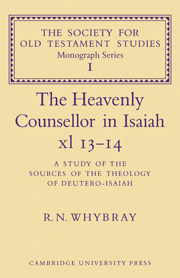Book contents
- Frontmatter
- Contents
- Acknowledgements
- Abbreviations
- Introduction
- I The context
- II Detailed interpretation
- III Literary characteristics
- IV Israelite kings and their councils
- V The origin of the divine council
- VI The assembly of the gods in Canaan
- VII The council of Yahweh in Israel
- VIII Yahweh and his advisers
- IX The office of counsellor
- X The divine counsellor in Babylonian myth
- XI Summary and conclusions
- Index of biblical references
- Index of authors cited
X - The divine counsellor in Babylonian myth
Published online by Cambridge University Press: 08 March 2010
- Frontmatter
- Contents
- Acknowledgements
- Abbreviations
- Introduction
- I The context
- II Detailed interpretation
- III Literary characteristics
- IV Israelite kings and their councils
- V The origin of the divine council
- VI The assembly of the gods in Canaan
- VII The council of Yahweh in Israel
- VIII Yahweh and his advisers
- IX The office of counsellor
- X The divine counsellor in Babylonian myth
- XI Summary and conclusions
- Index of biblical references
- Index of authors cited
Summary
The view that Deutero-Isaiah exercised his ministry in Babylonia among the Jewish exiles there rests mainly on the allusions in the book to the general political situation, in particular to the triumphant career of Cyrus king of Persia, and to the situation of the community of Jews to whom the oracles are addressed. But it is also supported by a number of clear references in the book to Babylonian religious beliefs and practices, which suggest that the prophet and his Jewish audience had a more intimate acquaintance with Babylonian religion than would be probable unless they were themselves resident in Babylonia.
This fact has admittedly been somewhat obscured by the rather unconvincing attempts which have been made to go further and to prove that Deutero-Isaiah was not only familiar with Babylonian culture and religion, but was himself actually influenced by it to such an extent that he borrowed stylistic features and religious ideas from Babylonian literature and used them to express his own teaching. The literature of Mesopotamia has been ransacked in an attempt to find verbal and conceptual parallels to Deutero-Isaiah's language, style and teaching, and many such have been pointed out. But in most cases the argument falls short of conclusive proof, and in some it is based on inadequate knowledge of the meaning of the texts.
- Type
- Chapter
- Information
- The Heavenly Counsellor in Isaiah xl 13-14A Study of the Sources of the Theology of Deutero-Isaiah, pp. 64 - 77Publisher: Cambridge University PressPrint publication year: 1971



